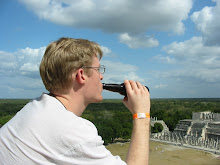Yesterday we were playing drums and generally getting lost in rhythm and worship, and we started using a wooden whistle from the Rio Carnival - the sort that would normally be blown, in the words of one participant, by "a bronzed bikini-clad Brazillian beach babe". And we were discussing the focus of our developing tribe, finding common ground and starting points of reference - foci on which we agreed and would like to build. In the discussion was a strong emphasis on the openness to inclusion (where appropriate, d'accord) of cultural elements and practices which may not necessarily fall within the accepted pantheon (if you'll excuse the pun) of Christian traditional activities.
Of course, a Brazillian carnival would not necessarily be the precise cultural exercise that would would try to include. But at its core, it is a celebration and festival involving dance, music and good food and drink, which are surely elements of any culture. Indeed, are these not elements which are central to our humanity?
"That whistle is an instrument of the Devil!" thunders the preacher, pounding his fist on a large bible with a black leather cover. Sweat glistens on his brow, his face is red and contorted with passion. "It is made for a grotesque festival of lust and godlessness, a feast of destruction and sin!" he cries.
But Satan has no instruments of his own. All things are created by and ordained by God. And all people, of all cutures and nations, are in with God if they want to be. "the Scriptures looked forward to this time when God would declare the Gentiles to be righteous because of their faith. God proclaimed this good news to Abraham long ago when he said, 'All nations will be blessed through you'." (Gal 3:8)
Thus it is not the whistle, or the food, or the person which is inherently wicked and perverse, but the practice and use to which it is put. And so why could we not put the same instruments to a different purpose? If the very body of Mary Magdalene, for instance, which had been entirely dedicated towards ungodly purposes, could be redeemed and made acceptable to God, is it so hard to believe that we could use a carnival whistle in worship? I mean, Christmas is pretty much a pagan festival, but the church certainly tries its hardest to extract something Christian from it...
Of course, there are certain caveats to this, as further mentioned in Galatians, where Paul exhorts us to be pure in our intent. "If pleasing people were my goal, I would not be Christ’s servant." (Gal 1:10) But with that in mind, it's all potentially useful for the sacred. Paul himself was an example of an instrument of wickedness reworked to divine purpose, which he points out later in that letter. Much of his text expresses concern for those who have come to know God, and yet still fall back into ways of ritual and law, where they should be exploring new freedom and joy in their faith, unbounded by petty restrictions of culture and tradition. He goes so far as to call the Galatians "foolish" and "bewitched", in their habit of returning to routine and legalistic forms of worship, rather than following the spirit of their faith.
Anyway, enough with the heavy stuff. The point is, if you want to do your thang in worship by dancing naked in the desert while banging a drum, you go do that - just don't try to impress anyone with it. Oh, and take some suncream.
All in agreement?
Subscribe to:
Post Comments (Atom)

2 comments:
Nice post Mike.
I like the way you "hone in" on certain things. Popcorn, now the carnival whistle. Trying to evaluate its potential to be "sacrelised".
You are getting to know me, I am of the opinion that everything is potentially sacred. I ask not "Why should we consider this sacred?", I ask "Why should we NOT consider this sacred?"
As for things carnival, I am fully in favour.
Drum on, warrior brave...
Well now Mike. Dancing naked in the desert banging a drum. What a fine suggestion for a team-building activity. Would we consider this sacred or scared...?
Post a Comment